Sunday Mar 01, 2026
Sunday Mar 01, 2026
Friday, 5 June 2015 00:05 - - {{hitsCtrl.values.hits}}
CSR Lanka, which positions itself as the apex body for corporate social responsibility in Sri Lanka organised its second major corporate advocation. The three-day session brought together both the public and private sector to look at collaboration and inter dependence for more holistic CSR with CSR Lanka taking on the role of advocator and facilitator.
International CSR Guru Dr. Wayne Visser was also in Sri Lanka for the second time, to guide participants of the workshop to become more focussed in getting into transformative CSR. The Professor was accompanied by his wife Indira Kartallozi, founder and director of Chrysalis Family Futures, a social enterprise that stands for protection and empowering of human and socio-economic rights of vulnerable and marginalised families and children.
Indira who had her own evening talk session on Social Entrepreneurship on Protection and Promotion at the British Council, has 15-years experience in advice on welfare, housing and immigration rights. Her expertise ranges on issues of forced migration and human rights.
The event was with a commitment supported by the Dutch Embassy in Sri Lanka who incidentally was also the sponsor of last year’s CSR Conference. The three unique events on three consecutive days from 22 to 24 April held at the Kingsbury hotel, Colombo, consisted of a Breakfast forum for CEOs and Chairpersons of private sector companies, a Public Sector forum ‘Building platforms to build bridges between public and private sectors’ and a strategic business session for CSR and sustainability professionals from the corporate sector.
Dr. and Mrs. Visser visited the Kandalama hotel and the Bodyline factor in Horana, both of which were organised by CSR Lanka as field visits to showcase local CSR initiatives.
![]()
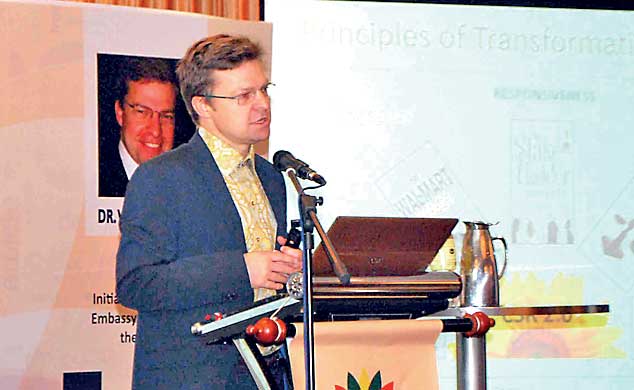
Dr. Wayne Visser
On his second visit to the island, Dr. Wayne Visser gave a strong message to the public sector saying that Sri Lanka should not be looking at the Indian model, where it is mandatory that large companies spend 2% of net profits on CSR projects. He said, “I see the role of Government becoming stronger in the CSR space going forward, especially compared with the last two decades of deregulation we have seen; but it has to be the right kind of policy intervention. What I strongly emphasise is that Sri Lanka should not follow the path of India, which has created mandatory CSR as part of their new Companies Act 2013.”
He says that mandatory CSR is simply another kind of tax on companies, which only helps to reinforce the idea that CSR is merely about philanthropy. “We can instead look to the policies of the EU and of other countries like South Africa, which has good legislation on issues that would concern CSR; such as policies governing labour rights, anti-corruption, environmental integrity and so on. And then allow companies to adapt, to innovate in order to meet those standards that governments put out in the form of policy.
“I also believe very strongly in the need for public private partnerships; although according to our research at the Cambridge University they often failed because the power was not balanced between the two parties or because they don’t have a common objective; or because they don’t surface their different expectations at the beginning. So it’s very important that each party brings a different set of skills, competencies and strengths but that they are seen as equal partners; and also that they are properly resourced and funded.”
Dr. Visser says that where collaboration was seen to work well in Europe and elsewhere in the world was when there were honest brokers. For example, he highlighted the Corporate Leaders’ Group on Climate Change, facilitated by the University of Cambridge on behalf of the Prince of Wales. It acts as a broker between business represented by CEOs of the largest companies in Europe and the government, which is trying to push forth policy.
“It helps to break the catch 22 where governments are afraid of businesses lobbying against them when they introduce higher standards of policy and at the same time businesses feeling that the policy guidance is not clear and ambitious enough. That has been very successful as a process in the UK and Europe and now we have some of the strongest climate legislation in the world.”
According to Dr. Visser, in this sphere CSR should stand for Collaborative Social Responsibility. Speaking to public sector leaders who participated in the workshop, he said that CSR has changed over the last few decades and it’s no longer just for the corporate sector. “If you look at the ISO 26000 standard on social responsibility, it applies to all organisations including governments. Governments themselves must become socially responsible. Also, CSR is no longer just about charity or philanthropy. If we look at the seven core subjects of the ISO 26000, community development is only one of the subjects. It includes others like institutional effectiveness or good governance, human rights, labour rights, consumer issues, environmental issues and so on,” he said.
Dr. Visser says that in order to get to transformative CSR, which moves beyond defensive, philanthropic, promotional and strategic approaches; it’s not possible without government support. It is policy that can create an enabling environment, helping to change the rules of the game so that companies are actually rewarded for social responsibility and environmental integrity.
Speaking about the session he had with Public Sector officials Dr. Visser said there was a lot of interest and the questions asked by participants at the end of the session were very relevant. He says that they showed a realisation that the ministries and the Government have a role to play, although it was clear that there was still a division between business and Government. The Government sector officials asked questions on how to create the right investment incentives to change behaviour of businesses so that they don’t encourage investment in Sri Lanka that is a race to the bottom in terms of standards as well as questions around how to hold public sector officials responsible for promoting responsible and sustainable businesses.
In response to questions around what should be a priority for the Government, Dr. Visser said that policy or legislation that requires companies to disclose publicly their social and environmental impacts in the form of CSR reporting or non financial disclosure was where a lot of movement was seen internationally.
Just in December the EU had come up with a directive on non-financial reporting which he thought would really stimulate progress here in Sri Lanka if we had something similar. He also suggested that Sri Lanka has supportive legislation for social enterprises similar to that of India’s Section 8 legislation, or the community interest companies of the UK or the for-benefit B-Corps of America.
![]()
Dr. Wayne Visser in his message to CSR and Sustainability Managers of the Sri Lankan private sector, said that the difference between old style CSR (corporate social responsibility) and transformative CSR really comes down to integration; and whether companies can integrate the needs and concerns of stakeholders right through into their management systems and strategic goals. “A very important step in that integration, which I call integrated value, is the step of what is called break through analysis. This is the step in which you use social and environmental stretch goals to bring about innovation,” he said.
He highlighted examples of sustainability innovations that are changing the industrial model, promoting a circular economy and bringing about solutions to some of the biggest challenges in today’s world. Dr. Visser pointed to technologies such as online electric vehicles, 3D printing, use of self-healing materials, delivery of nutrition at molecular level, nano technologies that work with human health, water purification, carbon capture and so on; all of which are innovations that change the game, and fall among the top 10 technologies that the World Economic Forum identifies as ‘likely to radically change the future’.
“I looked specifically at innovations happening in Agri foods, and the materials used in the chemical industry. In Agri foods, for example, one of the technologies that are being implemented in Africa now (specifically Nigeria), is something called double cyclone flash dryers for making flour from Cassava. The advantage of using Cassava is not only because it’s nutritious but also because it grows underground and is less susceptible to droughts and disease. In order to make flour out of Cassava the liquid has to be taken out of it and that’s what the flash dryers do. Innovations in these flash drives have come so far that their energy efficiency has increased by a factor of 30, a radical improvement.”
In the materials industry, Dr. Visser looked at Adelca, a steel manufacturer in Ecuador which implemented electric arc furnace technology that allows them to use 100% recycled steel. For every ton of recycled steel that Adelca uses as input to their process, they save one and a half tons of iron, 75% less energy and 40% less water, resulting in a massive transformation in their impact and the steel is 100% recyclable. The only challenge for that company is to get the community to help them collect scrap steel that they can use as input to their process.
Another example Dr. Visser talked about was in the chemical sector. Braskem, a Brazilian company that is pioneering in bio plastics (bio PP and bio PE) makes plastic bottles from plant materials. For this company, it is not only a case of going back to nature but for every ton of bio plastic they produce, they are actually removing 2.5 tons of carbon dioxide from the atmosphere, thus reducing our impact on the climate.
“These examples were an illustration of the main point I was trying to get across; if you use innovation, the transformative model is that your product or your service inherently creates more value than it destroys. In other words the more of your product or service that is consumed, the better the world becomes,” said Dr. Visser.
Dr. Visser also gave CSR and Sustainability Managers some tools and standards that they needed to think about. “Intergraded value itself is a methodology that can be implemented, a six step methodology that is quite new. But in terms of practical methodologies there are various foot printing methodologies out there. For example how can you measure the life cycle impact of your products and companies? An organisation like the Global Footprint Network is one where tools and methodologies to help you implement that kind of measurement can be found.”
Speaking about the new integrated reporting framework, which is being positioned as the next new thing after the Global Reporting Initiative (GRI); Dr. Visser said, “That is a framework for reporting on whether you increase or decrease six capitals i.e. financial capital, manufacturing capital, human capital, social capital, intellectual capital and natural capital. The approach that we are trying to encourage is one of innovation. I would say the main secret to that is, the need for the leadership of an organisation to set what we sometimes call BHAGs; an acronym for ‘Big Hairy Audacious Goals.’
“In other words they are very ambitious strategic goals on sustainability that need to be set; similar to that of the Unilever goal to double in size, while halving their environment footprint, helping a billion people out of poverty and making their agricultural products 100% sustainably certified. A similar one is the interface goal of Mission Zero, which to have a zero negative impact on the environment by 2020.”
What these goals do says Dr. Visser, is force people to innovate and be creative in order to meet them, rather than engendering atick boxing exercise. “It’s the nature of social enterprise, if you get the purpose an organisation right; make your business about solving one of the major social or environmental challenges that the world faces; then you are far more likely to creatively contribute towards solving that problem than if you simply adopt a code or a standard and use a tick box approach.”
Impressions on Kandalama and Bodyline
Dr. Wayne Visser and wife Indira Kartallozi talk to Bodyline staff
By Wayne Visser and Indira Kartallozi
Upon arrival in Colombo, we were driven about five hours to an eco-hotel in the north called Kandalama, compliments of the hotel owners, Aitken Spence. Set in a tropical forest and overlooking a lake, the hotel is an inspiration in sustainability. The hotel windows are literally draped with jungle vines and families of monkeys are regular visitors to the balconies.
|
![]()
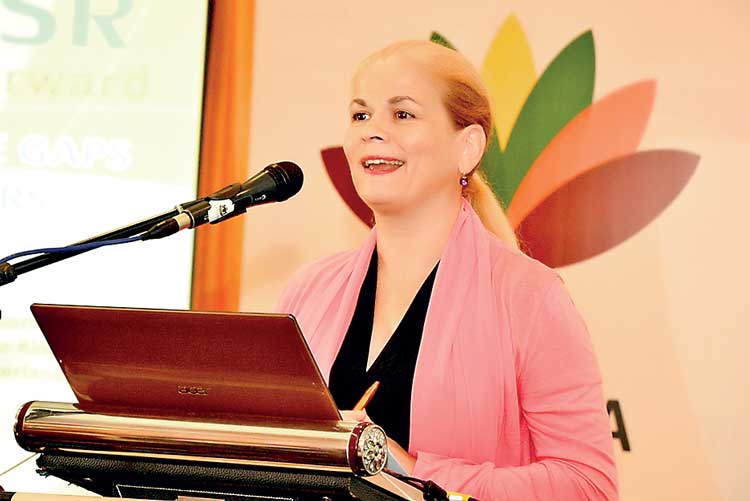
Embassy of the Kingdom of the Netherlands, Sri Lanka Deputy Head of Mission Lianne H.W.S Houben
The Netherlands Embassy Deputy Ambassador Lianne Houben speaking at the workshop said that for the Dutch, doing business comes with big responsibilities and that CSR policies are high on the Dutch government’s agenda. In fact, CSR policies are part of the Netherlands’ trade and business support policies.
“We support CSR internationally and especially events such as these, with the idea that in order for CSR to be effective, cooperation is required between business, government, knowledge institutes and civil society. The Dutch government is promoting such cooperation and wants to play a facilitating role by helping to create conditions that are favourable for implementing CSR policies by companies,” Houben said.
“Trade is in our blood. The VOC (The Dutch East India Company) was the first multinational company in the world. Today we are the second largest exporter of agricultural produce and the fifth largest exporter of goods in the world. We earn about 30% of our income from the export of goods and services. This means that Dutch companies have very close ties with foreign companies. The Dutch government actively tries to support and guide Dutch companies that are doing business across the border.
Houben said that the Netherlands has even developed a CSR passport to assist Dutch companies doing business across borders as some of the same rules and regulations governing CSR may not apply to some countries or might even be absent. This booklet, which was created by the Dutch Ministry of Foreign Affairs, in cooperation with other Dutch ministries, is a guideline for Dutch companies to invest abroad.
The book deals amongst others with responsible supply chains; sourcing of products (were they produced in a fair and honest way?); the risks involved; human and labour rights; and the way in which environmental issues, energy and corruption are being dealt with, etc.
The Dutch government encourages companies to adopt CSR, by providing information, promoting transparency and setting an example says the Deputy Ambassador. “I know this is easier said than done but it’s possible. Dutch companies have to account for projects that they undertake. The Netherlands government is actively involved in CSR. The Minister for Foreign Trade and Development Cooperation is responsible for International CSR Policy. National CSR policy falls under the remit of the Minister of Economic Affairs.
“CSR is not exclusive to the Netherlands; five years ago I visited Rwanda in east Africa; known to the outside world as a country that witnessed a horrible genocide resulting in 800,000 deaths. But they had done something remarkable. In 2008 Rwanda decided to completely ban the use of plastic bags. You will not find any garbage in the street.”
Speaking about Sri Lanka, she says that we are a country with a very impressive economic growth, “and with it comes more consumption resulting in more garbage. It’s a small island and garbage has to be dealt with responsibly. I do hope that the private and public sector in Sri Lanka will start a constructive dialog on how it can be done and find ways to become real CSR partners. Because CSR is not a matter which only concerns companies – both the public as well as the private sectors need each other to embrace CSR.
![]()
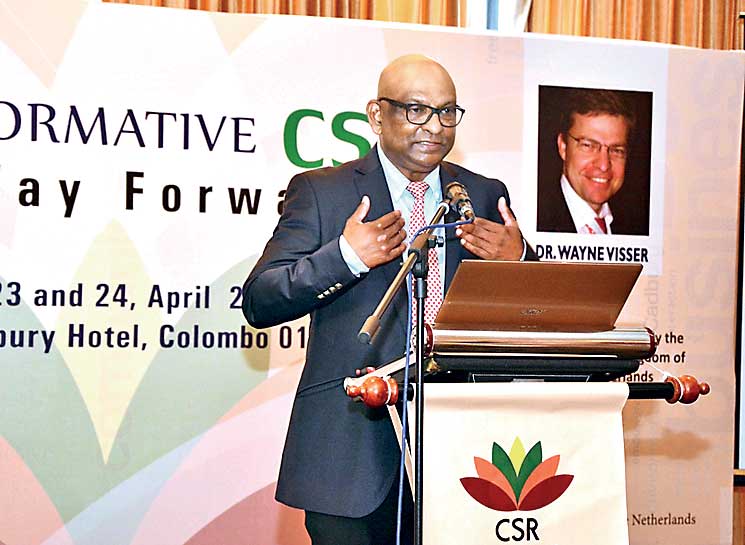
CSR Lanka Chairman Chandula Abeywickrema
Addressing the session for public sector officials on day two of the CSR workshop, CSR Lanka Chairman Chandula Abeywickrema said that collaboration, cooperation and partnership between the public and private sectors were key to social and economic development of the country.
He said that CSR Lanka would play the role of a facilitator, moderator or mediator to bring about this public private partnership. “We could act as honest brokers, trust worthy partners for both parties. I am sure we will be able to engage with the multi donors and agencies who would be willing to give us the technical support in order to device more inclusive laws and regulations which could be incorporated in parliament.”
Pointing to a statement made by a Government official that the private sector was the engine of growth, he said that whilst that was the accepted fact, the engine had to have so many other components to operate smoothly i.e. the diver, passengers and roads to travel on etc. “This is where facilitation becomes important and CSR Lanka is very well situated to take on that role,” said the Chairman.
He said that CSR Lanka was formulated to ensure that over Rs. 4 billion spent by the private sector on socially responsible projects every year would be channelled on a more national scale to create more social impact. “We recognise the role the state, public servants, senior officials; can play and through collaborating with the private sector, development can move across to all segments in a more inclusively manner. “CSR is not about giving some donation to a charity, educational institution or hospital; it has to be part of a company’s business DNA. It’s about inclusive engagement. We’ve already addressed private sector leaders on this subject, which was the first step. But they need public sector collaboration to bring about change.”
Giving an example on how the public and private sector can collaborate, Chandula said that every year 450,000 young people sit for O/Ls in this country and out of that 250,000 qualify to do Advanced Level. Of the 250,000 who sit for A/Levels, only 120,000 qualify for university entrance and of that only 25,000 get into universities. Therefore 425,000 youngsters would be out there looking for white colour jobs, but none of them are planning on becoming a mason, carpenter, electrician, plumber or a baker.
“That is the kind of challenge, which the private sector faces, as most don’t want to learn these skills and we need skilled people. 42,000 are added every year seeking white colour challenging opportunities; whereas the country needs a number of professional masons, electricians and carpenters. I was talking to the Director of NAITA, who told me that they had a carpentry diploma on offer but nobody wanted to enrol for that, although there is a need for good carpenters in this country.”
He says this is where public private sector synchronisation, collaboration can take place. The private sector can share plans and numbers of the kind of employees they need in the banking, health, trade, construction whatever the industry they operate in so that there is a schedule in the public domain as to what no of jobs would be available in a particular sector in the next five years. “This information is already there but the issue is, it is not getting across to the public sector or to the education system. Therefore, organisations with special needs have to collaborate in order to develop a greater program. We have to make sure our young people are made employable and that the right employment opportunities are provided.”
The Chairman of CSR Lanka says that when the private sector talks about triple bottom line i.e. the three P’s People, Planet and Profit; there is fourth P, which they overlooked and that was Progress. The private sector profit has to go towards the progress of people in the planet otherwise private sector business are don’t become sustainable.
“That’s the conviction we have. And as the private sector looks at this kind of transformative CSR, they need regulatory support from the public sector so the collaboration and cooperation from the public sector is absolutely essential. To ensure the private sector brings impactful engagement to employment generation, economic development and the social development and also development from an environmental aspect. The private sector has the wherewithal, capacity and capability to do it; and more importantly they are ready to collaborate with the public sector.”
![]()
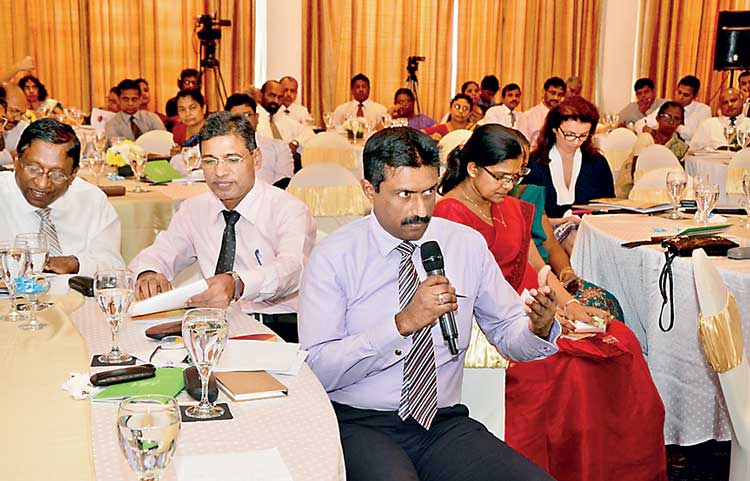
Ministry of Policy Planning Assistant Secretary Asanka Dayaratne
Professor Wayne Visser addressed over 60 key public sector officials on the ‘Importance of public sector support for CSR and identifying critical success factors for public private sector partnership’. His presentation culminated in an active forum with participants raising questions on the issues and bureaucracy involved in Sri Lanka’s public sector collaborating with the private sectors to do effective CSR; and a num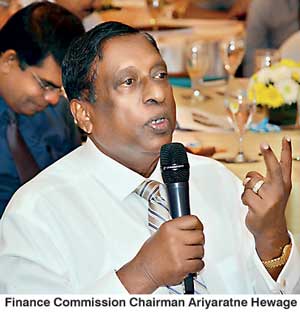 ber of important questions were raised by public sector officials.
ber of important questions were raised by public sector officials.
CSR Sri Lanka Chairman Chandula Abeywickrema summing up the program said that although Sri Lanka was privileged to have one of the best public/administrative service systems in the whole of Asia, there was a gap that needed to be bridged between the country’s private and public sectors.
“We boast of being one of the countries others wanted to follow pre 1956 on the basis of the bureaucracy and the institutional framework that existed here. However, if you look at the last two decades there is a distance between our public and private sectors. The Private sector runs according to its own agenda and has become more profit conscious while the Public sector has started to view the private sector with suspicion, because they are always on the look-out for various concessions.
Several of the public sector officials who participated in the forum raised a number of questions; Finance Commission Chairman Ariyaratne Hewage said that as far back as 1977, Sri Lanka accepted the open economic policies in principle and declared the private sector as the country’s main engine of growth. However despite these many policies, the public sector seems to have remained in a rut, going by British colonial era guide books ‘The Establishment Code’ and the ‘Financial Regulations’. He says that both guidebooks prevent public officers from interacting with the private sector, because they try to safeguard against being questioned by anybody or from being called for a disciplinary inquiry etc. and with this level of guarding one’s interests, there is no system to promote the public service to interact with the private sector.
Ministry of Policy Planning Assistant Secretary Asanka Dayarathne said a collaborative solution was required to solve environmental damage caused by harmful chemicals in fertiliser; especially contaminated water that causes kidney disease. He said that there was no proper policy on the usage of fertiliser and petro chemicals in this country and companies simply import fertiliser and petro chemicals without checks and balances and sell their products to farmers. Farmers too are not made aware of the varying quantities of fertiliser they need to use for plants and for the soil.
Sooriaya Hettiarachchi, from the DG Division said that although the Government during the last budgetary proposals had incorporated the concept of CSR and requested the private sector to come up with project proposals there had been no response. He said that CSR Sri Lanka might be a good mediator to facilitate the partnership between the public sector and private sectors.
Sri Lanka Institute of Development Administration Arjuna Wickramasnghe wanted to know the stages of transformative CSR, connected in particular to organic food products. Referring to the Patagonia example on their organic cotton production discussed during the program, he said that Sri Lanka needed organic products but were hampered by price issues, as their costs were significantly higher than what the ordinary person could afford.
![]()
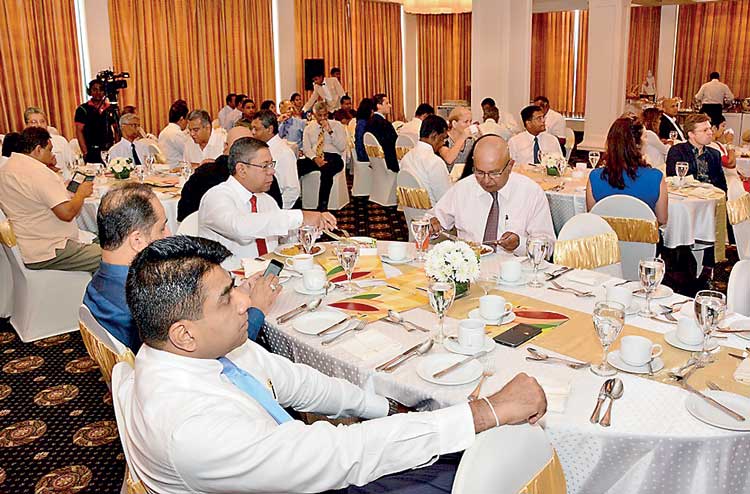
A section of the audience at the CEO Breakfast Forum
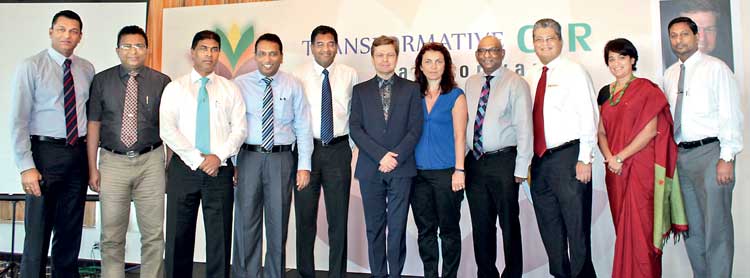
CSR Lanka Board with a few CEOs who attended the Breakfast Forum with Dr. Wayne Visser and wife Indira Kartallozi